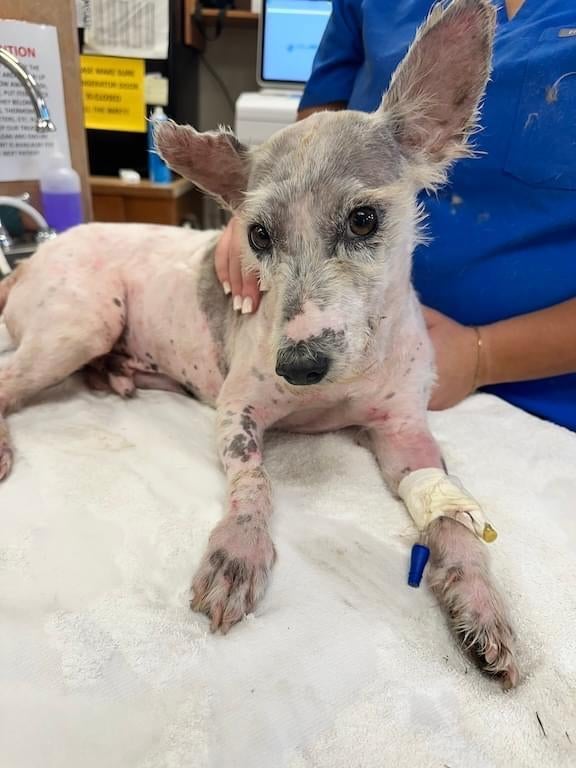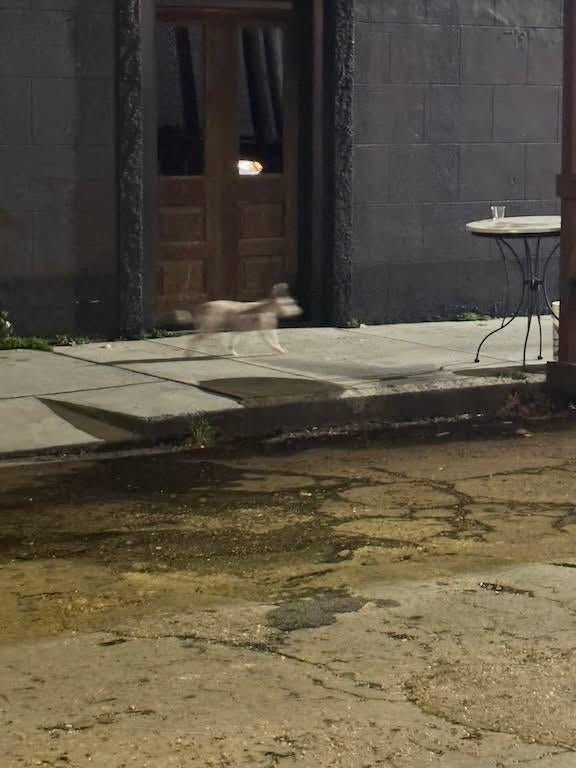CBS News
New Orleans community hopes to find rescue dog with a knack for escaping in time for Thanksgiving

New Orleans — A scraggly white Terrier named Scrim has captivated the hearts of many in New Orleans hoping to help him back to a safer, easier life in the Big Easy.
Scrim, already twice rescued this year, doesn’t seem to know what’s good for him. His knack for escaping helping hands and his catch-me-if-you-can elusiveness has led the doggo to go viral.
Zeus’ Rescues
Michelle Cheramie, with Zeus’ Rescues, first saved Scrim from a life on the streets earlier this year — but in April, he broke loose.
For months following his spring escape, Cheramie and many New Orleans neighbors searched for Scrim relentlessly to no avail. Hundreds of people commented and posted on social media with photos of his whereabouts and words of encouragement for the people trying to help the lost dog.
“He was shot twice during those six months that he was on the street, so yeah, humans are pretty scary to him,” Cheramie said.
It had seemed as though Scrim was more tricky to track down than Bigfoot, but finally in October, Scrim was found.
Once again, he found himself with a roof over his head. He received medical treatment for his wounds and he was even recognized by the New Orleans City Council.
But his life inside didn’t last long.
“We were just trying to teach him that human hands are actually good, and not all human hands hit you, and not all human feet kick you, and it took us the first couple of months that we had to convince him of that, and he had finally come around,” Cheramie said. “He’s just in that flight mode again where humans are scary.”
On Nov. 13, he jumped 13 feet out of a second-story screened window in Cheramie’s home.
“He actually broke out of the screen,” according to Cheramie, who said Scrim also managed to squeeze through a small gap in her front yard fence to complete his escape.
Now Cheramie’s back to searching the city streets, and dozens of people have called in to report Scrim sightings. This map has been tracking Scrim’s movements over the last 11 days.
Cheramie drives the streets daily in her rescue van in search of Scrim.
Zeus’ Rescues
“Everything we need to rescue Scrim when we get a sighting,” Cheramie said. “I have a dart rifle, we have net guns… it shoots out and it encapsulates him, and then we can jump on him.”
Cheramie has also been placing cameras in different locations where Scrim has been spotted.
One night, a camera captured him chowing down on some food left out for him, so Cheramie is comforted knowing he’s still alive and well.
Now she’s hoping to get Scrim home permanently — ideally just in time for a proper Thanksgiving feast.
“I’m pretty sure he’s cold wherever he is,” Cheramie said. “He’s smart enough that he probably is under a house somewhere and getting some heat that way, but no one knows for sure at this point.”
CBS News
Israel-Hezbollah ceasefire appears to hold as some Lebanese head home

Watch CBS News
Be the first to know
Get browser notifications for breaking news, live events, and exclusive reporting.
CBS News
New Jersey farmers struggle amid stubborn drought conditions

Chatsworth, New Jersey — At the age of 78, Stephen Lee III is facing an uncertain future.
Six generations of his family have farmed 135 acres of cranberry bogs in South Jersey.
“In farming, you don’t know what’s next,” Lee said.
In the last four months, it has only rained about three inches at the Lee Brothers Cranberry Farm — about a foot less than normal. Earlier this month, New Jersey declared a drought warning amid dry conditions that contributed to the spread of multiple wildfires in the state.
“The National Weather Service says this extreme drought in this part of South Jersey is a 150-year event,” Lee said.
And before temperatures dip to single digits, the cranberry bogs will have to be flooded to keep the fragile buds from drying out.
Typically, waterways feed into the Lees’ reservoir. But now it’s a surreal landscape, cracked and bone dry.
“It’s shocking,” Lee’s daughter Jennifer said. “And all you can do is kind of stare out and look at it.”
Jennifer says they turned to a backup well to pump water for their recent harvest. But even that well is 20 feet lower than normal.
“We’re lucky,” Jennifer explained. “There are some growers who don’t have a well and…they weren’t successful this year.”
Still, pumping the bogs with well water will cost nearly $30,000 in fuel this season.
And near the farm, a wildfire that started in July is still smoldering, fueled by the drought. It’s a threat that will keep Lee away from a Thanksgiving tradition of gathering with family in Maine.
“I’m going to stay here and smell for smoke and try to figure out if the cranberries are protected,” Lee said.
It’s the price of guarding next year’s crop and his family’s heritage.
CBS News
Has tipping in America reached a tipping point?

Poughkeepsie, New York — A controversial question facing customers at almost every cash register these days is whether they would like to leave a tip.
Many Americans think tipping has gotten out of control: Is it discretionary kindness or relentless obligation?
A November 2023 survey from the Pew Research Center found that 72% of people think tipping is expected in more places than it was five years ago. Some businesses that perhaps in the past were not known for asking for tips, such as drycleaners and hardware stores, now are.
Tipping is not just about percentages on a screen.
Dr. Paul Wright, senior vice president for the Neuroscience Institute with Nuvance Health in Poughkeepsie, New York, says that with tipping, the brain releases feel-good neurotransmitters like dopamine and oxytocin.
“Tipping is very similar to when you’re doing a good deed,” Wright explained. “…Many people do it for themselves, and not just for the recipient.”
But many Americans are not feeling that dopamine hit.
In a recent June 2023 survey from Bankrate, two-thirds of Americans now have a negative view of tipping, and one-third feel it’s “out of control.”
There’s also that pressure of the so-called “guilt trip tip.”
“Do I feel more obligated to tip when someone is looking at me with their big doe-eyes?” one woman at a coffee shop in Poughkeepsie told CBS News. “Probably.”
Others tip to right the wrong of wage inequality.
“People should be paid a living wage,” another coffee shop patron said. “People shouldn’t be dependent on the tipping system.”
Poughkeepsie restaurateur Russell Beck tried that.
“I think you should pay your people what they’re worth,” Beck said.
His “no tipping, please” wine bar, the 1915 Wine Cellar, began paying employees up to $30 an hour. But in wine there is a hard truth.
“Our accountant came back and said, ‘Listen, either you’re closing or you’re changing your pay model. There’s really no in-between,'” Beck said.
Beck believes he was naïve to think it could work. Now, with tips, both the bar and its employees have made more money.
Beck personally tips big. But he draws the line.
“It’s gotten crazy,” Beck said. “I ordered something online and I was asked if I wanted to tip the people that were going to be packaging the box. And I was like, excuse me?”











